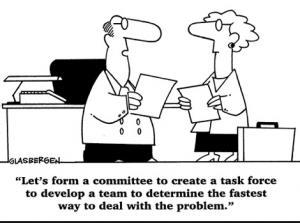My worldwide mission to destroy all executive committees
I’m on a worldwide mission to destroy all executive committees. Staff – and yes, even board members – are joining me in this mission.
- Written by
- Simone Joyaux
- Added
- November 15, 2013

Here’s what one executive director told me after she shared one of my executive committee rants with her board:
‘I fear it won’t be long before services will be scheduled for our soon-to-be-passing executive committee. Though she’ll be remembered with fondness, I can almost smell a board of directors that gives a crap again.’
Imagine, revitalising your board. Maybe your executive committee prohibits that.
So here’s the story: I have several worldwide missions. These missions define my life’s work. At every opportunity, I speak out and challenge people to talk about these issues. Things like philanthropy and equity...
And destroying all executive committees. ‘Amen, sister!’ said another executive director. And yet another was jumping up and down with joy and figuring out how he would raise the issue with the chair of his board.
Eventually, a board member called me. His organisation was thinking about establishing an executive committee. As we talked, he had a brilliant insight:
‘Our idea of establishing an executive committee is a response to deficiencies in the board.’
Don’t compensate, fix!

Wow! Talk about questioning the status quo. Talk about self-awareness. Has your organisation asked itself ‘why?’ Why do you want an executive committee? How will an executive committee add value?
Or are you just following what others have done – and those others didn’t ask themselves why? Are you compensating for a weakness instead of fixing the actual weakness? Do you just like the idea of a small, select group that takes care of things and… And what?
So: back to my worldwide mission to destroy all executive committees.
Here’s my perspective, which is gaining lots of traction whenever I share these thoughts. (And I talk about executive committees and their dangers every chance I get – and that’s a lot.)
First, let’s start with board committees in general. Most boards establish a number of committees, e.g., finance, governance, or, hopefully, fund development. But the premier committee, the trump-all committee, is the executive committee. It’s different from any other committee. The others have specific and limited scopes of work. The executive committee does not. Instead, the executive committee…well, it exists to...kinda...well, sort of…you know...
Here’s what yet another executive director said to me after reading my original blog about executive committees:
‘The sentence that really resonated with me [in your blog] is, “Some organisations establish an executive committee to compensate for a weak board. Fix the board.”
‘A person who is willing to sit on a board that uses an executive committee the way you, Simone, describe it might be wise to think about being part of that board. The fiduciary and overall responsibility that belongs to a board member isn’t diminished by the number of meetings she or he attends. The full responsibility falls on all the board members.'
Then she summarised:
‘My most recent board has had difficulty in getting members to attend meetings because they’re so disengaged. So the board decided to have meetings less often with executive meetings in between. Now, more of the members don’t have any idea what’s going on and I can’t see how that’s going to make them feel more useful. Scary.’
Scary, indeed, so destroy your executive committee. Or, at least, talk about its purpose, its added value and its dangers.
Reasons and answers

Who talks? The board: the full board, not the executive committee. Not the chair of the board only, the full board. The board decides what committees it does or doesn’t want.
But wait. There are all these reasons people cite for having an executive committee. But I have answers. Answers for every single reason anyone has ever raised to me.
Here’s the response to every one of the reasons people give for having an executive committee.
1. The executive committee meets in case of an emergency, in lieu of the board, because it’s hard to get the full board together.
Excuse me? It’s an emergency, something vital to the organisation, and you disregard the full board and bring together the executive committee. Ask the rest of your board members how they feel, giving this emergency power to a subset of the board. And in this day and age with conference call capability and email? Please. A true emergency belongs to the board.
2. The CEO needs a small group to talk with about very confidential items; a kind of think tank or kitchen table cabinet.
Stop right now! Nothing is confidential to a subset of the board. If any committee of the board knows something, it’s the right and responsibility of the full board to know it. Governance is the legal and moral authority of the board. The board cannot delegate that to any single individual or entity.
If a CEO wants a smaller group to chat with first about an issue, before talking with the full board, pick the people who have the expertise and particular insight about the issue. Be sure it doesn’t fall within the scope of any committee, e.g. governance, finance, fund development. If it does you should take it to that committee.
Or, let’s say you have a personnel issue. This is a management concern, not governance. But if you would like to talk to a couple of board members, phone a few, or bring them together, along with any outside experts that you feel could make a contribution. Remember, the CEO can chat with any board member she wishes. The CEO doesn’t need to get permission from the board chair. The CEO doesn’t need to pass everything by the board chair.
3. The executive committee includes the officers and committee chairs and sets board meeting agendas.
Seems to me that’s a waste of your board members valuable time. Imagine you are the treasurer. You chair the finance committee and go to those meetings. You serve on the executive committee and go to those meetings. And you go to board meetings. That’s a lot of meetings and time.
I recommend that the CEO and chair together develop the agenda of board meetings. The CEO should know what’s happening in every committee. Either the CEO is the staff person for a particular committee, or another member of staff, e.g. the chief development officer is on the fund development committee and keeps the CEO informed.
4. The executive committee does the performance appraisal of the CEO.
You don’t need an executive committee for this. You need an ad hoc task force that includes the right people. For example, someone with experience in personnel/human resources; perhaps a couple of board members who chair committees that have worked closely with the CEO recently. Maybe the current board chair, the immediate past chair, or the incoming chair.
Put together a task force that lasts for the few months of the appraisal process. Then terminate the task force.
5. Processing information over and over till you lose the edge.

So a committee discusses an issue. Then refers it to the executive committee. Then the executive committee takes it to the board. This would be great if the issue deserved lots of discussion. And sometimes, issues do, indeed.
Beware: repeated discussion may not add value. And by the time the issue gets to the board, some people have already talked themselves out. They’re bored. They’re impatient. And they act like it. So the full board – some of who were not on the previous committees – feel as if the discussion is getting short shrift. There’s nothing quite like trying to have a discussion when others say, ‘Oh yes, we already talked about that and…’ Exclusionary!
Executive committees are just too dangerous.To me, their danger far outweighs any particular benefit. There’s nothing an executive committee does or might do that cannot be done by another existing committee or an ad hoc task force.
And by the way, an executive committee by any other name... If it walks like a duck and quacks like a duck, it’s a duck! I worked for an organisation that used its finance committee as an executive committee. I know an organisation right now that is using its governance committee as an executive committee.
The board itself should do most of what an executive committee does. Quit disempowering the board! Quit creating a shadow board. Join my worldwide mission to destroy all executive committees. And start with your own.


















